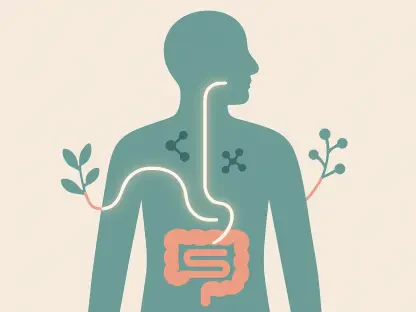Imagine a world where the simple act of choosing what’s on your dinner plate could slow the devastating effects of climate change and shield millions from life-threatening diseases, while also reshaping global health and sustainability. As global meat consumption surges, with projections estimating a staggering 76% increase by 2050, the toll of animal agriculture on both the environment and human health is becoming undeniable. This escalating trend fuels greenhouse gas emissions, devastates ecosystems, and amplifies health risks ranging from chronic illnesses to infectious outbreaks. The stakes couldn’t be higher, and the solution may lie in a fundamental shift toward plant-based eating—a strategy gaining traction among experts for its dual impact on sustainability and well-being. Insights from leading health journals underscore this urgency, positioning dietary change as not just a personal choice, but a critical lever for systemic transformation. This growing recognition invites a deeper look into how such a shift could reshape the future, addressing intertwined global crises with every bite.
Environmental Impact of Animal Agriculture
A Major Driver of Climate Change
The environmental footprint of animal agriculture stands as one of the most significant contributors to global warming, with cattle farming alone generating nearly half of the world’s methane emissions—a greenhouse gas far more potent than carbon dioxide. Beyond emissions, this industry claims two-thirds of habitable agricultural land, often at the expense of vital forests cleared for grazing or feed crops. Such deforestation not only accelerates climate change by reducing carbon-absorbing tree cover but also disrupts natural water cycles and soil health. The scale of this impact is staggering, as sprawling livestock operations continue to prioritize output over sustainability, pushing the planet closer to critical tipping points. With demand for meat projected to soar in the coming decades, the urgency to curb these practices intensifies, highlighting the need for alternative food systems that lessen the strain on Earth’s resources.
Compounding the issue, the ripple effects of animal agriculture extend into unforeseen corners of environmental degradation, altering landscapes in ways that threaten global stability. The loss of forests to make way for livestock doesn’t just release stored carbon into the atmosphere; it also fragments habitats, forcing wildlife into closer contact with human populations. This encroachment heightens the risk of zoonotic diseases—illnesses that jump from animals to humans—as natural barriers between species erode. Furthermore, the vast water and energy demands of raising livestock drain already scarce resources, particularly in regions grappling with drought and scarcity. Addressing this crisis requires more than incremental tweaks; it demands a bold rethinking of how food is produced and consumed, with plant-based diets emerging as a viable path to reduce these widespread harms.
Biodiversity Loss and Disease Spread
The destruction of ecosystems through animal agriculture has a profound impact on biodiversity, unraveling the delicate balance that sustains life on Earth. As vast swathes of land are converted for grazing or growing animal feed, countless species lose their habitats, leading to a sharp decline in wildlife populations. This loss isn’t merely a tragedy for nature—it directly undermines the ecosystem services that humans rely on, such as pollination, pest control, and climate regulation. Disrupted ecosystems create fertile ground for vector-borne diseases like malaria and dengue, as changing conditions allow disease-carrying organisms to thrive in new areas. The cascading effects of biodiversity loss reveal how deeply interconnected environmental health is with human survival, underscoring the need for sustainable dietary choices.
Beyond the immediate loss of species, altered landscapes foster conditions that amplify the transmission of infectious diseases, posing direct threats to public health. Deforestation and habitat fragmentation bring humans into closer proximity with wildlife, increasing the likelihood of pathogens spilling over into human populations—a phenomenon evident in past outbreaks of zoonotic diseases. Additionally, the intensive conditions of factory farming create breeding grounds for viruses and bacteria, where overcrowding and poor sanitation accelerate pathogen evolution. Shifting away from heavy reliance on animal products could mitigate these risks by reducing the scale of industrial farming and preserving natural barriers that keep dangerous diseases at bay. Such a transition offers a proactive way to safeguard communities from emerging health crises tied to environmental disruption.
Health Benefits of Plant-Based Diets
Reducing Chronic and Infectious Disease Risks
Adopting a plant-based diet brings a wealth of health advantages, particularly in slashing the risk of chronic conditions that burden healthcare systems worldwide. Diets centered on fruits, vegetables, legumes, and whole grains are consistently linked to lower rates of obesity, cardiovascular disease, type 2 diabetes, and certain cancers. These foods, packed with fiber, vitamins, and antioxidants like polyphenols, work to combat inflammation and support vital bodily functions, leading to reduced overall mortality. Unlike diets heavy in red and processed meats, which often contribute to health decline, plant-based eating provides a foundation for long-term wellness. As chronic diseases continue to drive up medical costs and diminish quality of life, embracing this dietary shift emerges as a powerful, preventive measure accessible to many.
Equally compelling is the growing evidence that plant-based diets offer protection against infectious diseases, a finding that has gained attention amid recent global health challenges. Studies reveal that healthcare workers following plant-based or pescatarian diets face up to a 73% lower risk of severe outcomes from illnesses like COVID-19, while hospitalized patients with higher fruit and vegetable intake often experience milder symptoms. The immune-boosting properties of plant-rich foods, which enhance the body’s ability to fight off pathogens, play a crucial role in this protective effect. This benefit extends to individuals managing chronic viral conditions such as HIV or hepatitis C, though more research is needed to fully understand the mechanisms. As infectious threats evolve, dietary habits that strengthen resilience could become a cornerstone of public health strategies.
Nutritional Power for Immunity
The nutritional profile of plant-based diets provides a robust shield for the immune system, equipping the body to better handle a range of health threats. Rich in essential nutrients like vitamin C, zinc, and antioxidants, these diets fortify immune responses by supporting the production of protective cells and reducing oxidative stress that can weaken defenses. Unlike animal-based foods, which often lack fiber and can promote inflammation when consumed in excess, plant foods foster a balanced internal environment conducive to healing and prevention. This nutritional edge becomes especially critical during periods of widespread illness, where stronger immunity can mean the difference between mild and severe outcomes. Highlighting these benefits in public health messaging could encourage wider adoption of such diets.
Moreover, the anti-inflammatory properties of plant-based eating contribute significantly to overall health, curbing the silent damage that underlies many diseases. Chronic inflammation, often fueled by diets high in saturated fats from animal products, is a known precursor to conditions ranging from heart disease to autoimmune disorders. In contrast, foods like leafy greens, berries, and nuts actively reduce inflammatory markers, creating a protective effect that extends beyond immediate symptoms. This capacity to address root causes of illness positions plant-based diets as more than a trend—they represent a fundamental shift in how nutrition can be harnessed for health. As awareness of these advantages spreads, integrating plant-based options into everyday meals could redefine standards of care and prevention.
Combating Antimicrobial Resistance (AMR)
Limiting Antibiotic Overuse
Antimicrobial resistance (AMR) ranks among the most urgent global health threats, as identified by the World Health Organization, and animal agriculture plays a central role in its escalation. In the United States, the majority of antibiotics sold are used in livestock, often for growth promotion and disease prevention rather than treatment. This widespread overuse creates resistant bacterial strains that spread through manure and runoff, contaminating soil, water, and ultimately human environments. The resulting superbugs pose a dire risk, rendering once-effective treatments useless against common infections. Tackling this crisis demands a hard look at farming practices, where reducing reliance on antibiotics starts with rethinking the scale of meat and dairy production that drives their use.
The connection between dietary habits and AMR reveals a clear path forward—cutting demand for animal products can directly limit antibiotic overuse in agriculture. By shifting consumer preferences toward plant-based foods, the pressure on livestock industries to rely on these drugs diminishes, slowing the development of resistant pathogens. This approach not only addresses environmental contamination from farm runoff but also protects public health by preserving the efficacy of life-saving medications. While regulatory measures in some regions have begun to curb antibiotic use in farming, broader change hinges on public awareness and market shifts. Encouraging plant-based eating as a norm could accelerate progress, offering a practical way to safeguard future generations from untreatable infections.
Broader Implications for Public Safety
The spread of resistant bacteria from agricultural settings into human communities underscores a hidden danger that transcends farm boundaries, threatening public safety on a massive scale. Contaminated water sources and food supplies serve as conduits for these pathogens, exposing populations to infections that defy conventional treatments. Hospitals, already strained by rising healthcare demands, face mounting challenges as AMR complicates even routine procedures like surgeries or childbirth. The economic and social costs of this crisis are immense, with prolonged illnesses and higher mortality rates straining resources. Addressing this issue through dietary change offers a proactive solution, reducing the root causes of resistance before they spiral into larger epidemics.
Furthermore, the global nature of AMR means that no region is immune, as resistant strains travel across borders through trade and migration, amplifying the need for coordinated action. While some countries have implemented stricter controls on antibiotic use in farming, inconsistent policies worldwide leave dangerous gaps. A shift toward plant-based diets can complement these efforts by decreasing the global demand for livestock products, thereby reducing the overall need for antibiotics in food production. This strategy aligns with broader public health goals, emphasizing prevention over reaction. As momentum builds for sustainable eating, the potential to mitigate AMR through everyday food choices becomes a compelling argument for systemic reform.
Barriers and Solutions to Adoption
Overcoming Socioeconomic and Cultural Challenges
Transitioning to plant-based diets faces significant obstacles, particularly in communities where access to affordable, nutritious options remains limited, and cultural norms often prioritize meat-heavy meals. Low-income areas frequently lack grocery stores stocked with fresh produce, leaving residents reliant on processed, animal-based foods that are cheaper in the short term but costlier for health in the long run. Additionally, many healthcare providers lack adequate training in nutritional counseling, missing opportunities to guide patients toward sustainable eating habits. These socioeconomic and educational barriers disproportionately affect vulnerable populations, deepening health disparities. Addressing these challenges requires targeted interventions that prioritize equity and accessibility in food systems.
Cultural preferences also pose a formidable hurdle, as dietary traditions rooted in meat consumption shape identities and social practices across the globe. Convincing entire communities to embrace plant-based eating demands sensitivity to these deeply held values, alongside efforts to reframe vegetables and legumes as central to meals rather than mere sides. Public health campaigns can play a role by highlighting culturally relevant plant-based recipes that honor heritage while promoting wellness. Moreover, partnerships with community leaders and local organizations can foster trust and encourage gradual shifts in eating patterns. Overcoming these barriers isn’t about erasing traditions but adapting them to align with environmental and health imperatives, ensuring inclusivity in the push for change.
Proven Strategies for Change
Despite the challenges, evidence suggests that plant-based diets can be both cost-effective and feasible, even in high-income countries where food budgets are often stretched thin. Studies indicate that these diets can be 22% to 34% cheaper than average meat-centric ones, debunking the myth that sustainable eating is a luxury. Real-world examples further bolster this case, such as New York City’s largest health system adopting plant-based meals as the default option for patients, resulting in a 36% reduction in food-related carbon emissions alongside significant cost savings. These initiatives demonstrate that institutional changes can drive broader adoption, proving that plant-based eating scales effectively when supported by policy and infrastructure. Such successes offer a blueprint for other regions looking to implement similar reforms.
Scaling these solutions requires systemic action, from government subsidies for plant-based foods to investments in urban farming that bring fresh produce closer to underserved areas. Hospitals and schools can lead by example, integrating plant-based defaults into their meal programs to normalize these choices and educate the public on their benefits. Additionally, policy reforms that redirect agricultural support away from industrial livestock operations toward sustainable crop production could reshape markets in favor of healthier options. These strategies not only address access and affordability but also build a culture of sustainability that benefits both people and the planet. As these efforts gain traction, the vision of a food system aligned with environmental and health goals moves closer to reality.
Building a Sustainable Future Through Diet
Reflecting on the strides made in recent years, the push for plant-based diets has gained remarkable ground as a response to intertwined climate and health crises. Hospitals adopting greener meal plans and cities investing in urban farming have already shown tangible reductions in emissions and healthcare costs. These early victories highlight how dietary shifts, even on a modest scale, deliver outsized benefits for communities and ecosystems alike. The evidence that has emerged is clear—cutting back on meat and dairy curbs environmental harm while bolstering defenses against chronic and infectious diseases. Looking back, those initial steps laid a critical foundation for broader change, proving that small choices collectively reshape global outcomes.
Moving forward, the focus must shift to actionable next steps that ensure this momentum continues to build. Governments and institutions should prioritize policies that make plant-based foods more accessible, such as incentivizing local growers and integrating nutrition education into healthcare training. Meanwhile, technology can play a role by advancing meat alternatives that appeal to diverse palates, easing the transition for reluctant adopters. Communities must also be empowered to drive change from the ground up, tailoring solutions to their unique needs and traditions. By fostering collaboration across sectors, the potential to transform food systems into engines of sustainability and health becomes not just a possibility, but an achievable goal for future generations.









